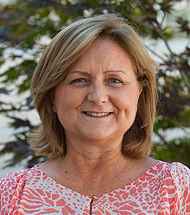17_6_20_EDU_detrill
María Die Trill: "It is a great satisfaction to be able to accompany patients and their families in the painful processes".
The psychologist spoke about the therapeutic care, teaching and psycho-oncology functions at the University of Navarra.

Fear, anguish, insomnia, difficulty concentrating, anxiety, depression, isolation, phobias... these are some of the psychological symptoms that a cancer patient may suffer during the course of the disease. Psycho-oncologist, María Die Trill, spoke about this on June 12 in her lecture entitled Psycho-oncology: A fundamental component of comprehensive care for cancer patients'..
The discussion paper, which took place on the classroom 120 of the Institute for Culture and Society (ICS) and which was organized by the School of Education and Psychology of the University of Navarra, was structured in the three functionalities of Psycho-oncology: Assistance, teaching and research.
"It is a great satisfaction to be able to accompany patients and their families through the painful process," said Die Trill. According to the president-elect of the International Society for Psycho-oncology, psychotherapeutic follow-up can facilitate psychosocial adaptation to the disease and its treatments, as well as the medical decision-making process. "It is fundamental the availability of attendance psychological for the family. Cancer is a family disease and we help them manage their own emotions," he said.
The importance of CommunicationAs for the field professor, according to the psychologist, patients going through the disease, as well as their families, must be taught to respond and not to react. "There are doctor-patient communication protocols for transmitting bad news in oncology. One example is the SPIKES program (Setting up the interview; Invitation; Giving Knowledge; Emotions). In addition, the patient's profile must be taken into account; treating a child is not the same as treating an adult, as their capacity for understanding is not equally developed". In this sense, in the discussion paper reference letter was made to the conspiracies of silence. "There are some families that interfere in giving information or even in the treatment of the patient. To avoid these situations, we must ally ourselves with the families and empower them. It is a very scary disease, so communication is essential."
Finally, in order to promote research in this field, María Die Trill opted for opening more Psycho-oncology units in hospitals with professionals who have a good training and experience. "In this way, care for patients and their families is normalized, facilitating the partnership between psycho-oncologists and other healthcare professionals."

